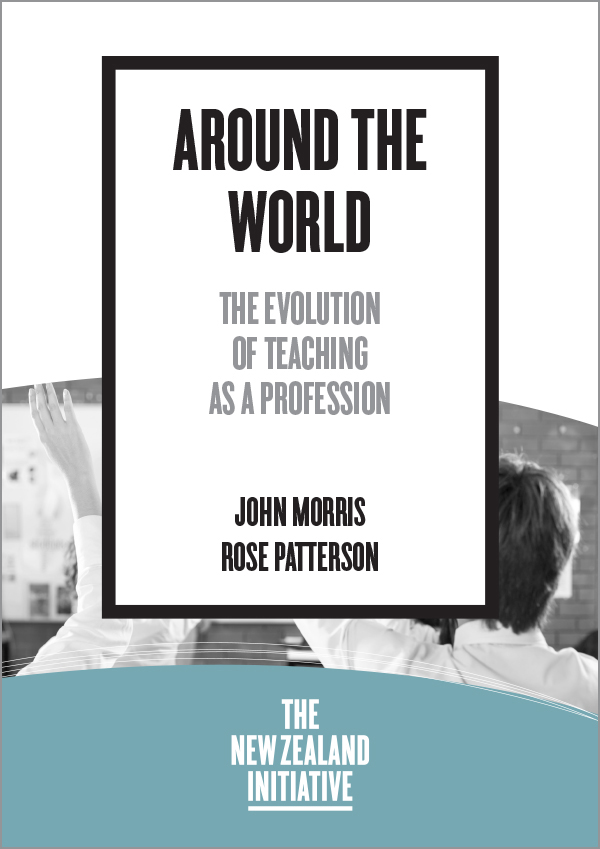Teachers are New Zealand’s most important educational asset. This report is the second in a series of three, building on the first - World Class Education: Why New Zealand Must Strengthen Its Teaching Profession, which identified some of the main structural problems preventing New Zealand’s teaching workforce from developing further.
This report tells the story of a journey to talk with policymakers, politicians, and educators about teacher quality policies in six countries: Singapore, Germany, Finland, England, Canada and Australia. Some of these countries outperform New Zealand in measures of student achievement. Some fare worse, but are reforming to improve teacher quality.
The goal of the field research was to think about which policies could be adapted for New Zealand’s unique structural, political and cultural context to strengthen the teaching profession. The third report will in turn present a series of policy recommendations. This report found that the best education systems:
Select the best teachers
Successful jurisdictions have several quality control gates in place to ensure that only the most dedicated, motivated, and academically bright people who have rapport with children become teachers. Singapore now includes a period of teaching in schools as part of the selection process. Germany’s teachers must pass several difficult examinations, including observations of interactions with students.
However, being selective relies on having a large pool of high-quality candidates to select from in the first place. In Singapore, one in 10 applicants are admitted to teacher training, and in Finland, only 800 primary school trainee teachers are selected from a pool of 7,000 applicants. The status of teaching must be high to attract the best and brightest.
Some jurisdictions are increasing the pool of potential teachers by encouraging mature professionals, who would otherwise be deterred by the time and cost barriers of additional training, into teaching. England, for example, is offering salaried school-based teacher training for graduates with professional experience. Germany and Singapore are also encouraging “side entrants” into the profession. Opening up the pool of potential teachers to select from, of course allows for more selectivity.
Bridge the theory-practice nexus
Teacher training has been brought into universities worldwide since the 1970s, and this has enhanced the status of teaching and provided teachers with strong theoretical foundations in pedagogy. In Finland and Germany teaching is a master’s level degree, and Singapore is incentivising teachers to undertake master’s degrees, giving teachers a research-orientation to their work. As a consequence, however, jurisdictions worldwide are grappling with the ‘theory-practice’ nexus – how to prepare teachers adequately for the practical realities of the classroom.
Finland’s teacher training faculties own schools where trainee teachers do their practical training. In Singapore, every test and assignment has a practical application. In Germany, trainee teachers undergo a challenging two-year apprenticeship in schools after their theoretical study. England is shifting the weight of training to schools rather than universities, and the University of Melbourne in Australia has adopted a medical model of teacher training where teachers are trained in schools.
Offer an aspirational career with remuneration tied to skills
Singapore’s ‘teaching track’ is a model of career progression for classroom teachers, motivating teachers who do not necessarily wish to move into school leadership to continue to grow professionally. Teachers move from ‘Senior’ to ‘Lead’ to ‘Master’ and finally to ‘Principal Master’ teacher.
While teachers worldwide are often attracted to teaching for the “love of teaching”, remuneration is important for retaining excellent teachers in the profession. England has disbanded the step-lock pay scale to give more autonomy to principals to use pay to recognise and reward excellent teaching.
This research found that competitive systems of remuneration and career progression need not be at the expense of teacher collaboration, especially if career progression is dependent on the proven ability to work collaboratively with others, as is the case in Singapore. Even Finland, which prides itself on being non-competitive, offers bonuses to teachers with exceptional skills.
Australia, recognising that career appraisal and performance management systems are often bureaucratic ‘tick-the-box’ exercises, has developed a framework that is designed to be flexible and responsive to individual schools.
Develop teacher capacity ‘laterally’
Career structures that encourage teachers to lead other teachers are indicative of a trend towards ‘lateral capacity building’, where top teachers and schools share their skills and expertise with other teachers and schools to lift the game for everyone. This is preferable to top-down control, which by contrast, takes professional ownership away from teachers.
All around the world, ‘Professional Learning Communities’ (PLCs) are emerging. External one-off courses are no longer seen as the answer for professional development. Instead, teams of teachers work together to improve student achievement. Lateral capacity building is seen in Singapore’s ‘teaching track’ career model, and in the way England’s schools are ‘chaining’ together. Similarly, Ontario’s leading schools pair up with other schools that serve a similar profile of students to help them raise student achievement.
Teaching as a profession
Worldwide, teaching is evolving into a professional career. The best teachers share their skills to help others develop their teaching capacity, and are recognised with remuneration. As such, a deeper sense of professionalism, responsibility, and community accountability is being embedded in teaching. The emergence of a teacher-owned Royal College of Teaching in England, for example, is symptomatic of the desire to move teaching into the professional realm there.
The evolution of teaching as a profession raises the status and the attractiveness of teaching, creating a positive cycle:
more high-calibre people become interested in teaching as a profession, making entry to teacher training more competitive, thus increasing the quality of people entering teaching.
Successful jurisdictions have deliberately implemented policies to raise the status of teaching, showing that regardless of culture, it is possible to take action. Teaching, worldwide, is evolving into a professional career. New Zealand’s teachers deserve the same professional opportunities and recognition.




